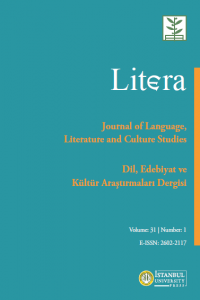Öz
Kaynakça
- Althusser, L. (2008). Ideology and Ideological State Apparatuses. London, Verso.
- Booker, M. K. (1994). The Dystopian Impulse in Modern Literature: Fiction as Social Criticism. Westport, CT: Greenwood.
- ---. (1994). Dystopian Literature: A Theory and Research Guide. Westport, CT: Greenwood, Print.
- Cixous, H. (1996). Sorties. In P. Rice and P. Waugh. (Eds.) Modern Literary Theory: A Reader (pp. 137-144). New York: Arnold.
- ---. (2008). “The Laugh of the Medusa”. Trans. Keith and Paula Cohen. Signs 1.4 (1976): 875-893.
- Claeys, G. (2010). “The Origins of Dystopia: Wells, Huxley and Orwell”. G. Claeys (Ed.) The Cambridge Companion to Utopian Literature (pp. 107-31) Cambridge: Cambridge UP.
- Fiske, S. T., & Stevens, L. E. (1993). What’s so special about sex? Gender stereotyping and discrimination. In S. Oskamp & M. Costanzo (Eds.), Claremont Symposium on Applied Social Psychology, Vol. 6. Gender issues in contemporary society (pp. 173–196). Sage Publications, Inc.
- Foucault, M. (1995) .“Discipline & Punish”. The Birth of Prison. Translated by Alan Sheridan. New York, Vintage Books.
- Irigaray, L. (1985). “This Sex Which Is Not One” This Sex Which Is Not One. Ithaca, NY: Cornell UP, 23-33.
- ---. (2004). “The Power of Discourse and the Subordination of the Feminine.” Literary Theory: An Anthology. Rivkin, Julie, and Michael Ryan (Eds.) Malden, MA: Blackwell Pub., 570-574.
- ---. (2004). “Commodities amongst Themselves.” Literary Theory: An Anthology. Rivkin Julie, and Michael Ryan (eds.) Malden, MA: Blackwell Pub., 574-578.
- Kolmar, Wendy K., and Frances B. (2005). ““Feminism” from The Feminist Dictionary.” Feminist Theory: A Reader. Boston: McGraw-Hill Higher Education, 7-11.
- Kumar, K. (1987). “Anti-Utopia, Shadow of Utopia.” Utopia and Anti-utopia in Modern Times. Oxford, UK: Blackwell, 99-130.
- Mackintosh, S. (2020). Blue Ticket. New York, USA, Doubleday.
- Morris, P. (1993). Literature and Feminism: An Introduction. Oxford, UK: Blackwell.
- Ruppert, P. (1986). Reader in a Strange Land: The Activity of Reading Literary Utopias. Athens: U of Georgia.
Öz
Sophie Mackintosh’s Blue Ticket touches upon the issues of gender roles, femininity, motherhood as well as oppression, dystopian restrictions, the abandonment of free will and predetermined life. As a lottery is used in the narrative to determine women’s lives, the deconstruction of gender roles as well as a nightmarish system of oppression of women are thoroughly analysed in the novel. Since women’s writing and women’s issues have become quite relevant and topical today, Blue Ticket offers a deeper analysis and a horrible story about the aforementioned concepts. This paper aims to show how gender roles and the existence of women are reflected in Mackintosh’s feminist dystopian narrative Blue Ticket by making use of Luce Irigaray’s, Helene Cixous’s and Michel Foucault’s theories in which femininity, sex, gender roles, biological representation, and panopticon become prominent. Considering the fact that women’s writing and restrictions of gender roles go hand in hand in contemporary British fiction, this study brings out significant results about how Mackintosh evaluates those issues with a unique voice and what her female characters tell the readers about living a pre-determined life. In a world where women are given only two options, which are provided by pure chance in a lottery, of either having a baby or being used for the sexual pleasure of men, the conventional issues of femininity and gender roles are scrutinized with current patriarchal power relations and dystopian regimes.
Anahtar Kelimeler
Kaynakça
- Althusser, L. (2008). Ideology and Ideological State Apparatuses. London, Verso.
- Booker, M. K. (1994). The Dystopian Impulse in Modern Literature: Fiction as Social Criticism. Westport, CT: Greenwood.
- ---. (1994). Dystopian Literature: A Theory and Research Guide. Westport, CT: Greenwood, Print.
- Cixous, H. (1996). Sorties. In P. Rice and P. Waugh. (Eds.) Modern Literary Theory: A Reader (pp. 137-144). New York: Arnold.
- ---. (2008). “The Laugh of the Medusa”. Trans. Keith and Paula Cohen. Signs 1.4 (1976): 875-893.
- Claeys, G. (2010). “The Origins of Dystopia: Wells, Huxley and Orwell”. G. Claeys (Ed.) The Cambridge Companion to Utopian Literature (pp. 107-31) Cambridge: Cambridge UP.
- Fiske, S. T., & Stevens, L. E. (1993). What’s so special about sex? Gender stereotyping and discrimination. In S. Oskamp & M. Costanzo (Eds.), Claremont Symposium on Applied Social Psychology, Vol. 6. Gender issues in contemporary society (pp. 173–196). Sage Publications, Inc.
- Foucault, M. (1995) .“Discipline & Punish”. The Birth of Prison. Translated by Alan Sheridan. New York, Vintage Books.
- Irigaray, L. (1985). “This Sex Which Is Not One” This Sex Which Is Not One. Ithaca, NY: Cornell UP, 23-33.
- ---. (2004). “The Power of Discourse and the Subordination of the Feminine.” Literary Theory: An Anthology. Rivkin, Julie, and Michael Ryan (Eds.) Malden, MA: Blackwell Pub., 570-574.
- ---. (2004). “Commodities amongst Themselves.” Literary Theory: An Anthology. Rivkin Julie, and Michael Ryan (eds.) Malden, MA: Blackwell Pub., 574-578.
- Kolmar, Wendy K., and Frances B. (2005). ““Feminism” from The Feminist Dictionary.” Feminist Theory: A Reader. Boston: McGraw-Hill Higher Education, 7-11.
- Kumar, K. (1987). “Anti-Utopia, Shadow of Utopia.” Utopia and Anti-utopia in Modern Times. Oxford, UK: Blackwell, 99-130.
- Mackintosh, S. (2020). Blue Ticket. New York, USA, Doubleday.
- Morris, P. (1993). Literature and Feminism: An Introduction. Oxford, UK: Blackwell.
- Ruppert, P. (1986). Reader in a Strange Land: The Activity of Reading Literary Utopias. Athens: U of Georgia.
Ayrıntılar
| Birincil Dil | İngilizce |
|---|---|
| Konular | Sanat ve Edebiyat |
| Bölüm | Araştırma Makaleleri |
| Yazarlar | |
| Yayımlanma Tarihi | 23 Haziran 2021 |
| Gönderilme Tarihi | 31 Ocak 2021 |
| Yayımlandığı Sayı | Yıl 2021 Cilt: 31 Sayı: 1 |


